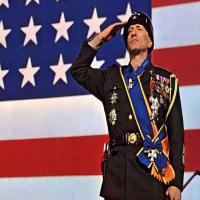
General George S. Patton
CBUB Wins: 0
CBUB Losses: 0
CBUB Ties: 0
Win Percentage: 0%
Added by: ViceCityMobster86
Read more about General George S. Patton at: Wikipedia
Official Site: Public Domain
George Smith Patton, Jr. (November 11, 1885 – December 21, 1945) was a United States Army officer best known for his leadership while commanding corps and armies as a general during World War II. He was also well known for his controversial outspokenness.
Patton was commissioned in the U.S. Army after his graduation from the U.S. Military Academy at West Point in 1909. In 1916-17, he participated in the unsuccessful Pancho Villa Expedition, a U.S. operation that attempted to capture the Mexican revolutionary. In World War I, he was the first officer assigned to the new United States Tank Corps and saw action in France. After the war, he was a strong advocate of armored warfare; however, in the interwar period, budget cuts to the U.S. Army caused by the Great Depression saw Patton abandon his advocacy of the tank in favor of the cheaper and politically more popular maintenance of horse cavalry. This abandonment of the tank came at a time when Patton's longtime friend Dwight D. Eisenhower was actively seeking his support for the U.S. Army to adopt the revolutionary Christie tank (which was subsequently developed into the famed T-34 in Russia). Eisenhower felt this was a betrayal of principles for political expediency and was the start of the decline of the friendship between the two men (source: De Este and Farago biographies).
In World War II, he commanded corps and armies in North Africa, Sicily, and the European Theater of Operations. Near the end of the Sicilian campaign, he jeopardized his career by slapping a soldier (whom he regarded as a coward) while the soldier was recuperating from battle fatigue at a hospital. Relieved of his command by Allied Supreme Commander General Dwight D. Eisenhower over the well-publicized incident, Patton was relegated to acting as a decoy in Operation Quicksilver instead of playing a major part in the Normandy Landings and Operation Overlord; however, he was later given command of the U.S. Third Army and ably led it in breaking out of the hedgerows of Normandy and across France. A surprise German offensive at the Battle of the Bulge resulted in American units being surrounded at Bastogne, but Patton rapidly disengaged his army from fighting in another sector and moved it over 100 miles in 48 hours to help relieve the siege.
George Smith Patton was born in San Gabriel Township, California (in what is now the city of San Marino), to George Smith Patton, Sr. (1856–1927) and Ruth Wilson (1861–1928). Although he was technically the third George Smith Patton, he was given the name Junior. The Pattons were an affluent family of Scottish descent.
CBUB Match Record:
No Regular Play Records Available
No Fantasy Draft Records Available
